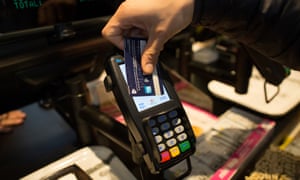
Adam Forrest Monday 9 January, 2017
Scrolling
through my online bank statements at Christmas, I was surprised to find
I had not removed cash from an ATM for well over four months. Thanks to
the ubiquity of electronic payment systems, it has become increasingly
easy to glide around London to a chorus of approving bleeps.
As more shops and transport networks adapt to contactless card and
touch-and-go mobile technology, many major cities around the world are
in the process of relegating cash to second-class status. Some London
shops and cafes are now, like the capital’s buses, simply refusing to
handle notes or coins.
Could we see a whole city go cash-free? From Seoul to Bergamo,
cities big and small are at the forefront of a global drive to go
digital. Many of us are happy to tap cards or phones to hop on a bus,
buy a coffee or pay for groceries, but it raises the prospect of a time
we no longer carry any cash at all.
No spare change for the busker at the station, the person sleeping
rough in need of a hot drink, the market trader, the donation box.
Although even on-street charity fundraisers are now broaching the world of contactless payments, what might the rise of the cashless city mean for street vendors, small merchants and the poorest inhabitants?
Some experts now fear a two-tier urban realm in which those on the
lowest incomes become disconnected from mainstream commercial life by
their dependence on traditional forms of currency.
“The beauty of cash is that it’s a direct and simple transaction
between all kinds of different people, no matter how rich or poor,”
explains financial writer Dominic Frisby. “If you begin to insist on
cashlessness, it does put pressure on you to be banked and signed up to
financial system, and many of the poorest are likely to remain outside
of that system. So there is this real danger of exclusion.”
Ajay Banga, Mastercard’s CEO, has spoken about the growing global risk of “creating islands, where the unbanked transact [only] with each other”.
In India, the question of how the poorest might connect with the
digitised world of the middle-class consumer is now of central
importance. In November, the prime minister Narendra Modi announced the removal of 500 and 1000 rupee notes
from circulation. Part of a wider attempt to jolt the nation into
joining the cashless revolution, Modi’s government believes restricting
currency and pushing the take-up of electronic payment will help tackle
corruption and regulate India’s untaxed, “black” economy.
Saurabh Shukla, the Delhi-based editor in chief at NewsMobile Asia,
says he has seen many small “mom and pop” store owners introduce card
readers and learn how to use Paytm, a mobile payment platform, over the
past two months.
“They realise a big change is here and they are trying to adjust to
electronic payment,” he explains. “But they still want to convert back
to cash at the end of the working day or the working week. It will be a
gradual adjustment. We might not be able to create a completely cashless
India, but we can aim to create a low cash economy.”
Modi is encouraging state government to create “smart” cities by
connecting their public services with the latest online technology.
Officials are aiming to make the Chandigarh – famously designed by
modernist architect Le Corbusier – India’s first cashless city by insisting all bills are paid electronically at government offices. And the government of Goa is attempting to turn its capital Panjim cash-free
by offering discounts in digitally bought services like train tickets,
and by setting up classrooms to teach small traders e-payment
technology.
Yet huge queues remain outside banks as many Indians continue to
demand cash. Some of the poorest street vendors cannot afford card
readers, and have struggled to operate Paytm payment transfers on their
mobile phones.
Aires Rodrigues, a human rights lawyer in Goa, says traders in Panjim
are suffering. Rickshaw drivers and fish market sellers have been left
with no way of accepting payment from middle-class customers now
inclined to do everything digitally. “It’s senseless to try to make
everyone go cashless,” says Rodrigues. “The government seems to have
lost sight of the plight of the common man.”
If India’s urbanites are being forced to undergo digital shock
therapy, city dwellers in much of Europe have been moving steadily away
from cash. Consumers like convenience. Governments like the idea of tax
transparency. And retailers like cutting down on the costs of cash
handling. The Guardian
No comments:
Post a Comment